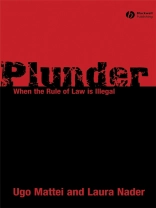Plunder examines the dark side of the Rule of Law and explores how it has been used as a powerful political weapon by Western countries in order to legitimize plunder – the practice of violent extraction by stronger political actors victimizing weaker ones.
- Challenges traditionally held beliefs in the sanctity of the Rule of Law by exposing its dark side
- Examines the Rule of Law’s relationship with ‘plunder’ – the practice of violent extraction by stronger political actors victimizing weaker ones – in the service of Western cultural and economic domination
- Provides global examples of plunder: of oil in Iraq; of ideas in the form of Western patents and intellectual property rights imposed on weaker peoples; and of liberty in the United States
- Dares to ask the paradoxical question – is the Rule of Law itself illegal?
विषयसूची
Preface.
Introduction.
1. Plunder and The Rule of Law .
An Anatomy of Plunder.
Plunder, Hegemony, and Positional Superiority.
Law, Plunder, and European Expansionism.
Institutionalizing Plunder: The Colonial Relationship and the Imperial Project.
A Story of Continuity: Constructing the Empire of Law (lessness).
2. Neo-liberalism: Economic Engine of Plunder.
The Argentinean Bonanza.
Neo-Liberalism: An Economic Theory of Simplification and a Spectacular Project.
Structural Adjustment Programs and the Comprehensive Development Framework.
Development Frameworks, Plunder, and the Rule of Law.
3. Before Neo-Liberalism: a Story of Western Plunder .
The European Roots of Colonial Plunder.
The Fundamental Structure of US Law as a Post-Colonial Reception.
A Theory of Lack, Yesterday and Today.
Before Neo-Liberalism: Colonial Practices and Harmonious Strategies—Yesterday and Now.
4. Plunder of Ideas and the Providers of Legitimacy .
Hegemony and legal Consciousness.
Intellectual Property as Plunder of Ideas.
Providing Legitimacy: Law and Economics.
Providing Legitimacy: Lawyers and Anthropologists.
5. Constructing the Conditions for Plunder .
Plunder of Oil: Iraq and Elsewhere.
The New World Order of Plunder.
Not Only Iraq: Plunder, War, and Legal Ideologies of Intervention.
Institutional Lacks as Conditions for Plunder: Real or Created?.
Double Standards Policy and Plunder.
Poverty: Justification for Intervention and Consequence of Plunder.
6. International Imperial Law .
Reactive Institutions of Imperial Plunder.
U.S. Rule of Law: Forms of Global Domination.
The Globalization of the American Way.
An Ideological Institution of Global Governance: International Law.
Holocaust Litigation: Back to the Future.
The Swallowing of International Law by U.S. law.
Economic Power and the U.S. Courts as Imperial Agencies.
7. Hegemony and Plunder. The Demise of the Rule of Law in the United States .
Strategies to Subordinate the Rule of Law to Plunder.
Plunder in High Places: Enron and its Aftermath.
Plunder in Even Higher Places: Electoral Politics and Plunder.
Plunder of Liberty: The War on Terror.
Plunder Undisrupted: The Discourse of Patriotism.
8. Beyond an Illegal Rule of Law?.
Summing Up: Plunder and The Global Transformation of the Law.
Imperial Rule of Law or the People’s Rule of Law.
The Future of Plunder.
Notes to Text.
Selected Further Reading.
Documentary Film Resources.
Index
लेखक के बारे में
Ugo Mattei is Distinguished Professor of International and Comparative Law at University of California, Hastings and at the University of Turin, Italy. He is a widely published scholar in economic and political aspects of law and his work has been translated into many languages. His professional activities have included substantive periods of teaching and research in Europe, Africa, and Latin America.
Laura Nader is Professor of Anthropology at University of California, Berkeley and is possibly the leading world authority in Anthropology of Law. She has conducted fieldwork in Lebanon, Mexico, and the US and her groundbreaking work on harmony ideology and access to law and her unmatchable publication list make Nader one of the most interesting voices in the current academic scene.












